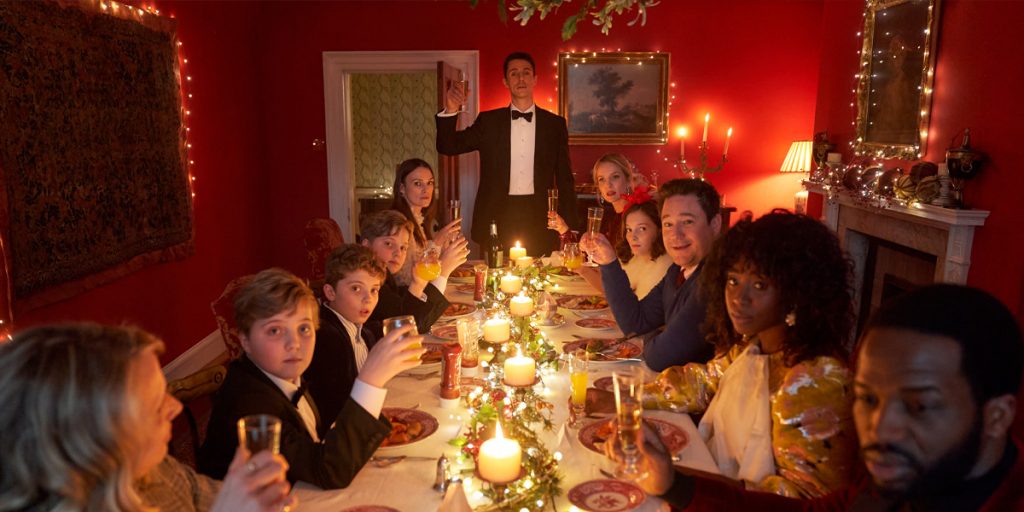Camille Griffin’s satirist Christmas film Silent Night is ambitious in its social commentary but forgettable in its narrative and nuance.
Camille Griffin’s directorial debut, Silent Night, documents the reunion of a group of old school friends, who come together to celebrate Christmas. However, this is no average Christmas – because they’re all about to die. As a result of the earth’s mistreatment, a toxic eruption has released poisonous fumes and promises to wipe out the whole of mankind. Before the sun rises on the following day, each member of the party will swallow their government-distributed EXIT pill, a fictitious tablet that will allow people to ‘die with dignity’ before the fumes reach them.
Silent Night starts in a typical Christmas film manner, with married couple Nell (Keira Knightley) and husband Simon (Matthew Goode, of Freud’s Last Session) stressed as they prepare to welcome their friends into Nell’s mother’s idyllic home in the British countryside. Whilst they flap around the home, obedient son Art (Roman Griffin Davis) is dressed and ready for the day, whereas on-screen/off-screen twins Thomas and Hardy (Gilby and Hardy Griffin Davis) haven’t even got in the bath. We are also introduced to the guests as they journey to the house in all their reluctancy. This includes Bella (Lucy Punch) and girlfriend Alex (Kirby Howell-Baptiste), married couple Sandra (Annabelle Wallis, of Malignant) and Tony (Rufus Jones) with daughter Kitty (Davida McKenzie), and, lastly, James (Sopé Dírísù) and his young, beautiful, American girlfriend Sophie (Lily-Rose Depp, of Voyagers).
After the guests arrive, typical Christmas day festivities commence. Everyone gathers around the table, and they share a Christmas dinner, they play Charades, open presents, and set off fireworks. However, it is clear the thought of their impending deaths weighs heavily on their minds, with young Art finding it the hardest of all to deal with. Through his lens, which is that of a child’s innocence being dismantled, he highlights the corruptness of the government, issues of class, and the environmental strain that led them there. After one outburst, he sits and questions his father Simon about the EXIT pill. He asks, ‘is it true people haven’t been given a pill?’ to which Simon replies, ‘Homeless people and illegal immigrants […] won’t have been given a pill […] because, according to the government, they don’t legally exist.’ Although production on Silent Night started before the COVID-19 pandemic happened, similarities between this fictitious government and the real UK government are hard to ignore, as they too have been unwilling to help the lower class. In this way, Silent Night is an interesting political commentary with Griffin perhaps suggesting the hope for the future lies with the younger generation.

With this being the focus of Silent Night, Camille Griffin fails to explore other elements of the film with the sensitivity they deserve. In one scene, the adults sit in the living room looking through old photos of themselves. This would have been the perfect opportunity for the self-reflection and emotion that is expected from an apocalypse movie. Abruptly, the topic of conversation turns to Sandra’s alluded molestation, which is news to all but Sandra and James. Although these big reveals are expected on your last night on earth, Griffin fails to spend any time exploring these topics, their seriousness, and the devastating consequences they have. Not only could this conversation have offered a powerful narrative on sexual abuse, but it could have allowed for a deeper exploration of Sandra and Tony’s relationship. It would have been invaluable to the audience to see beyond their comedic rapport and instead uncover a meaningful relationship as a way of upping the stakes and encouraging more audience investment. Instead, the topic is skirted over and resolved with a quick group hug.
The cast is punctuated with great actors, such as Keira Knightley, Matthew Goode, and Lily Rose-Depp. However, Silent Night fails to bring depth to any of the characters beyond Art and therefore their performances feel forgettable and their casting out of place. The plot dips and dives, desperately trying to cling onto one character after another but never truly sticking. There is an urgency to build fully fleshed out characters in Silent Night’s short runtime so that their deaths have an impact on the audience. Unfortunately, this feels like Silent Night’s biggest oversight.
Ultimately, Silent Night is refreshing in its apocalyptic twist to a Christmas film. It offers an eye-opening political commentary and explores the urgency of environmental strain. However, despite its promise of dark humour, deep reflection, and forgiveness, everything remains surface level. With its lack of consist tone and fleeting attention to each character, Griffin runs the risk of leaving audiences unmoved.
Silent Night is now available to watch on digital and on demand.

